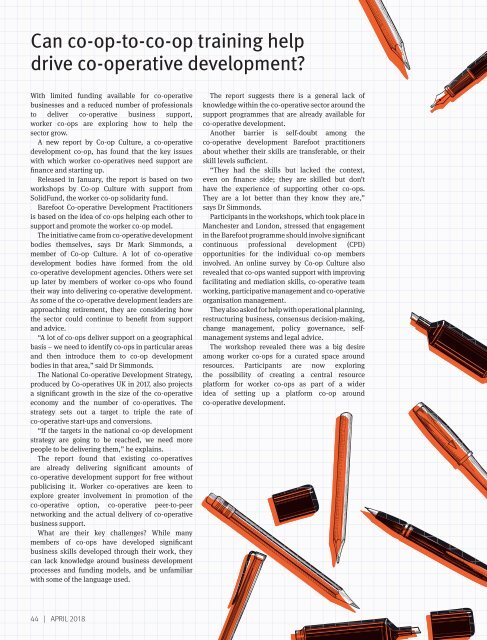APRIL 2018
The April 2018 edition of Co-op News: connecting, challenging and championing the global co-operative movement. This issue, in the lead up to Co-operative Education Conference, we look at how co-ops are putting principle 5 into action in the 21st century. We also celebrate 150 years of the East of England Co-op and present updates from the Co-op Retail and Abcul conferences.
The April 2018 edition of Co-op News: connecting, challenging and championing the global co-operative movement. This issue, in the lead up to Co-operative Education Conference, we look at how co-ops are putting principle 5 into action in the 21st century. We also celebrate 150 years of the East of England Co-op and present updates from the Co-op Retail and Abcul conferences.
Create successful ePaper yourself
Turn your PDF publications into a flip-book with our unique Google optimized e-Paper software.
Can co-op-to-co-op training help<br />
drive co-operative development?<br />
With limited funding available for co-operative<br />
businesses and a reduced number of professionals<br />
to deliver co-operative business support,<br />
worker co-ops are exploring how to help the<br />
sector grow.<br />
A new report by Co-op Culture, a co-operative<br />
development co-op, has found that the key issues<br />
with which worker co-operatives need support are<br />
finance and starting up.<br />
Released in January, the report is based on two<br />
workshops by Co-op Culture with support from<br />
SolidFund, the worker co-op solidarity fund.<br />
Barefoot Co-operative Development Practitioners<br />
is based on the idea of co-ops helping each other to<br />
support and promote the worker co-op model.<br />
The initiative came from co-operative development<br />
bodies themselves, says Dr Mark Simmonds, a<br />
member of Co-op Culture. A lot of co-operative<br />
development bodies have formed from the old<br />
co-operative development agencies. Others were set<br />
up later by members of worker co-ops who found<br />
their way into delivering co-operative development.<br />
As some of the co-operative development leaders are<br />
approaching retirement, they are considering how<br />
the sector could continue to benefit from support<br />
and advice.<br />
“A lot of co-ops deliver support on a geographical<br />
basis – we need to identify co-ops in particular areas<br />
and then introduce them to co-op development<br />
bodies in that area,” said Dr Simmonds.<br />
The National Co-operative Development Strategy,<br />
produced by Co-operatives UK in 2017, also projects<br />
a significant growth in the size of the co-operative<br />
economy and the number of co-operatives. The<br />
strategy sets out a target to triple the rate of<br />
co-operative start-ups and conversions.<br />
“If the targets in the national co-op development<br />
strategy are going to be reached, we need more<br />
people to be delivering them,” he explains.<br />
The report found that existing co-operatives<br />
are already delivering significant amounts of<br />
co-operative development support for free without<br />
publicising it. Worker co-operatives are keen to<br />
explore greater involvement in promotion of the<br />
co-operative option, co-operative peer-to-peer<br />
networking and the actual delivery of co-operative<br />
business support.<br />
What are their key challenges? While many<br />
members of co-ops have developed significant<br />
business skills developed through their work, they<br />
can lack knowledge around business development<br />
processes and funding models, and be unfamiliar<br />
with some of the language used.<br />
The report suggests there is a general lack of<br />
knowledge within the co-operative sector around the<br />
support programmes that are already available for<br />
co-operative development.<br />
Another barrier is self-doubt among the<br />
co-operative development Barefoot practitioners<br />
about whether their skills are transferable, or their<br />
skill levels sufficient.<br />
“They had the skills but lacked the context,<br />
even on finance side; they are skilled but don’t<br />
have the experience of supporting other co-ops.<br />
They are a lot better than they know they are,”<br />
says Dr Simmonds.<br />
Participants in the workshops, which took place in<br />
Manchester and London, stressed that engagement<br />
in the Barefoot programme should involve significant<br />
continuous professional development (CPD)<br />
opportunities for the individual co-op members<br />
involved. An online survey by Co-op Culture also<br />
revealed that co-ops wanted support with improving<br />
facilitating and mediation skills, co-operative team<br />
working, participative management and co-operative<br />
organisation management.<br />
They also asked for help with operational planning,<br />
restructuring business, consensus decision-making,<br />
change management, policy governance, selfmanagement<br />
systems and legal advice.<br />
The workshop revealed there was a big desire<br />
among worker co-ops for a curated space around<br />
resources. Participants are now exploring<br />
the possibility of creating a central resource<br />
platform for worker co-ops as part of a wider<br />
idea of setting up a platform co-op around<br />
co-operative development.<br />
44 | <strong>APRIL</strong> <strong>2018</strong>


















